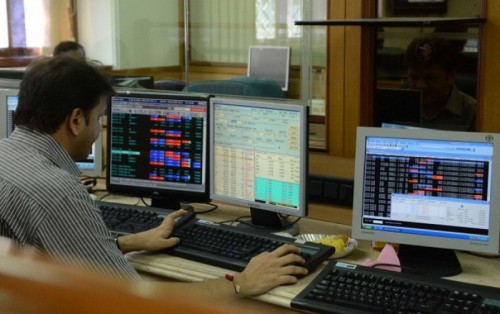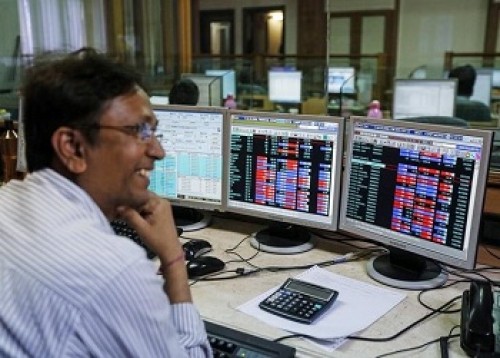Opening Bell : Markets likely to get positive start tracking gains in Asian counterparts; GDP data eyed

Follow us Now on Telegram ! Get daily 10 - 12 important updates on Business, Finance and Investment. Join our Telegram Channel
Indian markets ended lower on Thursday due to weak global cues and on eve of monthly F&O expiry. Today, markets are likely to get positive start tracking gains in Asian counterparts, as weaker U.S. growth data sent the dollar and bond yields tumbling and revived hopes for rate cuts by the Federal Reserve later this year. Domestically, investors will closely watch the release of Q4FY24 GDP data today. Besides, they will adjust their portfolios ahead of the release of exit polls tomorrow. Sentiments will get a boost as the Reserve Bank of India (RBI), in its annual report, projected Indian economy to grow at 7 percent in the current financial year with risks evenly balanced. Further, the report said India' GDP has expanded at a robust pace in 2023-24, with real GDP growth accelerating to 7.6 percent from 7 percent in the previous year - the third successive year of 7 percent or above growth. Besides, the Economist Intelligence Unit’s (EIU) Global Outlook report has forecast India to be the fastest growing major economy in 2024-2028, with its growth expected to outpace China’s. The report suggests that as India's economic heft expands, there would be a crossover in the mid-2040s with BRICS nations taking over the G7 in terms of nominal gross domestic product (GDP). Some support will come with report that the southwest monsoon set in over the Kerala coast and parts of the Northeast earlier than the forecast, marking the start of its four-month journey over India. An early and timely onset of monsoon is also a good sign for 2024 kharif crop production. However, foreign fund outflows likely to dent sentiments. Foreign institutional investors (FIIs) sold shares worth Rs 3,050.15 crore on May 30. traders will be concerned as foreign direct equity investments fell to a five-year low in the financial year ended March 31, 2024 (FY24) to $44.42 billion due to external factors such as high interest rates in advanced economies, and a limited absorptive capacity in various sectors in India. Data released by the Department for Promotion of Industry and Internal Trade (DPIIT) showed inflows contracted 3.5 per cent year-on-year (Y-o-Y) in FY24. Electric-vehicle related stocks will be in limelight after the NSE launched a new thematic index called Nifty EV & New Age Automotive index. The 33-stock index will track the performance of companies which form a part of the electric vehicle (EV) ecosystem, and led by stocks such as Bajaj Auto, Tata Motors, Mahindra & Mahindra and Maruti Suzuki. Banking sector stocks will be in focus after the Reserve Bank's annual report showed that the number of frauds in the banking sector went up to 36,075 in 2023-24 year-on-year, but the amount involved reduced by 46.7 per cent to Rs 13,930 crore. The RBI report also said that with an aim to curb frauds and enhance the payment experience further, the introduction of real-time payee name validation before the actual fund transfer will be explored in compliance with02 newly enacted The Digital Personal Data Protection Act, 2023.
The US markets ended lower on Thursday with the Nasdaq falling more than 1% and technology shares leading declines after a disappointing Salesforce forecast. Asian markets are trading higher on Friday as investors parsed data from major economies across the region.
Back home, continuing their falling streak, Indian equity benchmarks ended lower by around a percent on Thursday due to profit booking amid growing nervousness among investors ahead of the results of the Lok Sabha polls on June 4. Market participants also remained on sidelines ahead of India’s gross domestic product (GDP) data for Q4FY24. After a weak start, the markets extended the losses as the day progressed as traders got anxious with exchange data showing that foreign Institutional Investors (FIIs) offloaded equities worth Rs 5,841.84 crore on Wednesday. Some pessimism also came with data showing that foreign direct investment (FDI) equity inflows in India declined 3.49 per cent to $44.42 billion in 2023-24 due to lower infusion in sectors such as services, computer hardware and software, telecom, auto and pharma. FDI inflows stood at $46.03 billion during 2022-23. Inflows during January-March FY24, however, rose by 33.4 per cent to $12.38 billion as against $9.28 billion in the year-ago period. Sentiments remained down-beat in late afternoon deals even as S&P Global Ratings revised outlook for the Indian economy to positive from stable and has affirmed the overall rating at BBB- citing robust growth and improved quality of government expenditure. Traders overlooked Finance Minister Nirmala Sitharaman’s statement that S&P Global Ratings' revision of its outlook on India from 'stable' to 'positive' is a welcome development. She said this reflects India's solid growth performance and a promising economic outlook for the coming years. The minister noted that it has been possible due to the series of macroeconomic reforms undertaken since 2014, along with substantial outlay for capex, fiscal discipline, and decisive and visionary leadership. Traders also paid no heed towards credit rating agency, India Ratings and Research’s (Ind-Ra) latest report that the expected mammoth dividend transfer by the Reserve Bank of India (RBI) to the central government and subsequent spending by the latter, is likely to reduce the ongoing pressure on the banking system deposit accretion and overall rates in the system, a few days after the RBI approving the transfer of Rs 2,10,874 crore as surplus to the government for the accounting year 2023-24. Finally, the BSE Sensex fell 617.30 points or 0.83% to 73,885.60, and the CNX Nifty was down by 216.05 points or 0.95% points to 22,488.65.
Above views are of the author and not of the website kindly read disclaimer










Tag News

Market Quote : Consolidation continued in the market; a slowdown in earnings growth and a we...
More News

``Options Data Signals Strong Resistance at 23500, Support at 2300`` - Tradebulls Securities...











